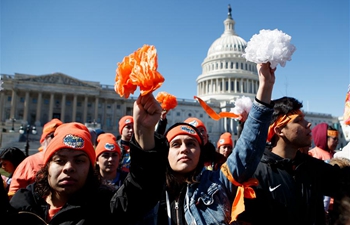WASHINGTON, March 6 (Xinhua) -- The U.S. Food and Drug Administration (FDA) authorized on Tuesday the first direct-to-consumer (DTC) test which can report three mutations in the BRCA breast cancer genes while giving strong warnings of its possible improper application.
The test analyzes DNA from a self-collected saliva sample to describe if a woman is at increased risk of developing breast or ovarian cancer, and if a man is at increased risk of developing breast or prostate cancer, according to the FDA.
"BRCA" stands for "Breast Cancer gene." BRCA1 and BRCA2 are two different genes that have been found to impact a person's chances of developing breast cancer.
"This test provides information to certain individuals who may be at increased breast, ovarian or prostate cancer risk and who might not otherwise get genetic screening, and is a step forward in the availability of DTC genetic tests," said Donald St. Pierre, acting director of the Office of In Vitro Diagnostics and Radiological Health at the FDA's Center for Devices and Radiological Health.
However, Pierre said "it has a lot of caveats" because only a small percentage of Americans carry one of these three mutations, and most BRCA mutations that increase an individual's risk are not detected by this test.
"The test should not be used as a substitute for seeing your doctor for cancer screenings or counseling on genetic and lifestyle factors that can increase or decrease cancer risk," Pierre said.
The test detects three out of more than 1,000 known BRCA mutations. This means a negative result does not rule out the possibility that an individual carries other BRCA mutations that increase cancer risk, according to the FDA.
About one in 400 people carries mutated BRCA1 or BRCA2 genes. Also, the FDA warned that most cases of cancer are not caused by hereditary gene mutations but caused by smoking, obesity, hormone use and other lifestyle factors.
The FDA granted the marketing authorization to 23andMe, a DNA genetic testing and analysis company based in Silicon Valley.













